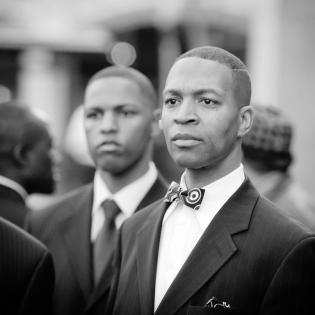Do the Write Thing
Writing letters to government officials is an effective way to take a stand on an issue. Young people use advocacy as a form of service.
The learner will:
- define advocacy as active verbal support for a cause or position.
- define service and social activism.
- write about an issue of interest to address through a letter-writing campaign.
- service: to provide a community or organization with something that it needs
- nonviolence: the principle of refraining from using violence, especially as a means of protest
- prejudice: a preformed opinion, usually an unfavorable one, based on insufficient knowledge, irrational feelings, or inaccurate stereotypes
- advocacy: active verbal support for a cause or position
Frank, Anne. Anne Frank: The Diary of a Young Girl. Bantam, 1993. ISBN-13: 978-0553296983
Instructions
Anticipatory Set:
Discuss the meaning of the quote: "The pen is mightier than the sword." This quote comes from author Edward Bulwer-Lytton. Ask for examples of how words and writing can be and have been more effective than war and fighting for changing government policies. We each have the power to take action for the good of others by using our writing talents. Define advocacy as "active verbal support for a cause or position" and it is a form of philanthropy (giving time, talent, or treasure or taking action for the common good).
Read aloud sections of the book Anne Frank: The Diary of a Young Girl that demonstrate the themes of prejudice and persecution. Discuss how this relate to discrimination and bias in today's culture.
- Anne wrote, “There are no walls, there are no bolts, no locks that anyone can put on your mind.”What does this mean to you?
- How did Anne Frank's writing become a powerful tool in the issue of persecution and prejudice?
- How did Dr. King's voice and writing become a powerful tool to fight against prejudice and injustice?
Determine an issue to address in the community and then encourage young people to use writing to advocate for positive change in the community. Examples may include smoking/drinking/drugs, violence, bullying, racism/discrimination/injustice, dropouts, global issues, illiteracy, and animal extinction. Once the list has been generated, brainstorm what facts and persuasive language can help to address these issues. They should investigate the issue further to learn more about its origins, causes, and impact on the community.
A letter-writing campaign is an effective advocacy tool for voicing opinions about specific issues. The letters may be directed toward a member of Congress or a particular government agency. Knowing that re-election depends on the votes of their constituents, Senators and Representatives pay close attention to the mail they receive. A sample letter is in the handouts below.
Legislators are on Capitol Hill to represent us, the people. The letter serves to educate the target person/audience about an issue and explains why you feel they should take action for/against that issue. Letter-writing campaigns are also a useful way to educate others about issues that are affecting them, and to get involved in political activism by expressing opinions to legislators.When youth write to elected officials, they are not only participating in the democratic process, they are affecting the outcome.
To find contact information for your legislators, search the internet for "find your legislators."
Handouts
Philanthropy Framework
-
Strand PHIL.I Definitions of Philanthropy
-
Standard DP 01. Define Philanthropy
-
Benchmark HS.1 Define philanthropy to include giving and sharing; volunteering; and private individual action intended for the common good. Explain how a volunteer individual/group can act for the common good.
-
-
-
Strand PHIL.II Philanthropy and Civil Society
-
Standard PCS 02. Diverse Cultures
-
Benchmark HS.2 Give examples from history of how intolerance of ideas, religion, and minorities contributed to social disintegration.
-
-
-
Strand PHIL.III Philanthropy and the Individual
-
Standard PI 01. Reasons for Individual Philanthropy
-
Benchmark HS.1 Define and give examples of motivations for giving and serving.
-
-
-
Strand PHIL.IV Volunteering and Service
-
Standard VS 01. Needs Assessment
-
Benchmark HS.1 Identify a need in the school, local community, state, nation, or world.
-
-
Standard VS 02. Service and Learning
-
Benchmark HS.1 Select a service project based on interests, abilities, and research.
-
-
Standard VS 03. Providing Service
-
Benchmark HS.1 Provide a needed service.
-
Benchmark HS.4 Demonstrate the skills needed for the successful performance of the volunteer job.
-
-
Standard VS 04. Raising Private Resources
-
Benchmark HS.3 Describe a detailed action for service.
-
-
Standard VS 05. Integrating the Service Experience into Learning
-
Benchmark HS.2 Evaluate progress on the service-learning project before, during, and after the project.
-
-
